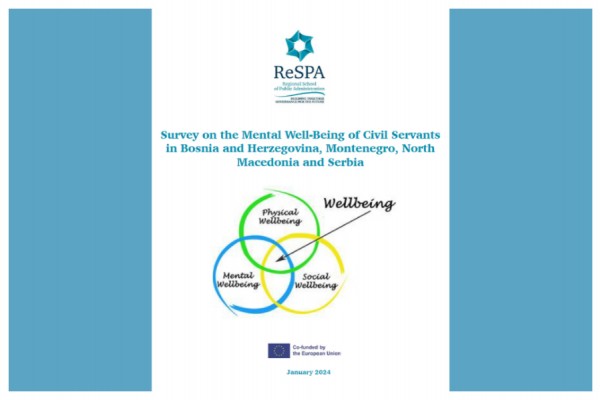
Our Well-Being Matters: ReSPA Presented the Results of the Mental Well-Being of Civil Servants Survey
28 March 2024, Online
During yesterday's virtual gathering, over 60 participants were enlightened about the mental health of civil servants in Bosnia and Herzegovina, Montenegro, North Macedonia, and Serbia. This was achieved through a comprehensive presentation of survey findings, delving into emotional, social, and psychological well-being. The survey also scrutinised potential disparities across various demographic factors among respondents, including gender, age, workplace, economic status, health condition, and job role. The study encompassed 5,669 civil servants, comprising 1,303 from Bosnia and Herzegovina, 838 from Montenegro, 1,293 from North Macedonia, and 2,235 from Serbia.
Some findings show that the overall mental well-being score is 3.49, slightly above average. Civil servants generally have positive feelings about their work, with an average emotional well-being rating of 3.45. Social well-being averages 3.39, and psychological well-being is slightly higher at 3.68 compared to other aspects of mental well-being. Regarding differences, men tend to exhibit somewhat higher well-being levels than women. Mental well-being tends to be lower among civil servants aged 31 to 50. No significant cultural differences in mental well-being among civil servants from the four ReSPA members were observed.
Some of the recommendations for improving the well-being of civil servants include identifying and addressing "hidden stress," implementing stress management practices like meditation and mindfulness, arranging training sessions on effective communication and active listening, and offering specialised managerial training to improve workload management and foster constructive feedback. Additionally, the report advocates for implementing routine mental well-being surveys across ReSPA members to track advancements, promote awareness, and exchange insights on mental health best practices.
Ljiljana MANIĆ, Professor at the Faculty of Contemporary Arts and the High School of Social Work in Belgrade, informed the audience about the paramount significance of mental well-being. She also delved into details regarding the size of the survey sample, structure of the questionnaire and shared insightful findings along with thoughtful recommendations.
Snežana ABRAMOVIĆ, Head of the Research Centre at the National Academy for Public Administration in Serbia, showcased a visual presentation of the survey results that she crafted following her participation in the ReSPA training on HR data analysis held in Sarajevo last year.
Jan MEYER SAHLING, a Professor of Political Science at the University of Nottingham, reflected on the report, emphasizing the imperative for heightened awareness of mental well-being. He also highlighted the significance of training programs to support civil servants in nurturing their well-being, with a particular focus on managers' pivotal role in fostering the mental health of their teams.
Ranka BARTULA MUŠIKIĆ, ReSPA Programme Manager and event moderator highlighted the significance of employee well-being, emphasised in both the Strasbourg and Ghent declarations, but also in the Joint Statement signed by the ministers from the Western Balkan administrations on the occasion of ReSPA High-Level Policy Dialogue held in Sarajevo last year. In the Ghent ministerial declaration, ministers highlighted the importance of prioritising all civil servants' health and well-being to promote mental and physical wellness.
As she concluded the event, she communicated, "Well-being encompasses than merely fulfilling duties; it involves thriving in our roles, fostering healthy relationships, and feeling empowered to address challenges effectively. Public servants are instrumental in shaping society, and they need to prioritise self-care, seek support when necessary, and advocate for a workplace culture that prioritises mental well-being."
Delve into the survey results HERE.



